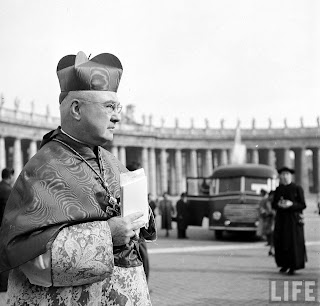Born in Massachusetts, Francis Joseph Spellman graduated from Fordham in 1911 and studied at the North American College in Rome, where he was ordained in 1916. He returned to Massachusetts as a priest of the Archdiocese of Boston. But Cardinal William O’Connell had little use for the new priest, assigning him to such unglamorous positions as circulation editor for the Boston Pilot and archdiocesan archivist, with his office in the Chancery basement.Not even Spellman’s strongest supporters deny that he was ambitious. Over the years he had kept in touch with his former professor in Rome, the future Cardinal Francesco Borgongini-Duca, who played a key role in getting him out of the basement. Through this connection, he was appointed director of the Knights of Columbus playgrounds in Rome, and he also worked as an attaché at the Vatican Secretariat of State, where he befriended Eugenio Pacelli, the future Pius XII. In 1932, Spellman returned to Boston as an Auxiliary Bishop, much to O’Connell’s chagrin. For the next seven years, Spellman was assigned menial tasks, but he used the time to cultivate close relations with the Kennedy family, and through them, President Franklin D, Roosevelt. When Cardinal Pacelli toured the United States in 1936, Bishop Spellman served as his guide, arranging a meeting between FDR and the future pope.Less than six weeks after Pacelli was elected Pope in March 1939, Spellman was named Archbishop of New York. A capable administrator, he cleaned up the archdiocese’s debts and centralized administration. In 1939 he was named Military Vicar for the Armed Forces, which kept him prominent in both secular and religious circles during the war. Archdiocesan historian Monsignor Thomas Shelley writes that Spellman came to personify the patriotism of American Catholics. He also gives a fair assessment of Spellman when he writes: “A notably ambitious man, Spellman wedded his ambition to the service of both his Church and his country and made outstanding contributions to both.”












